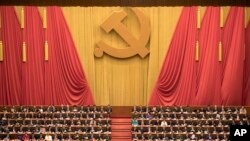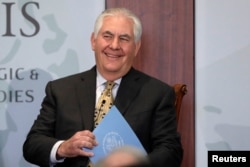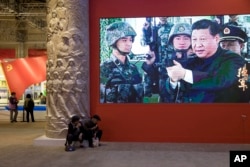U.S. intelligence officials are closely watching developments during China's 19th Party Congress, calling it a key test for Chinese President Xi Jinping and a telling barometer of what type of relationship Beijing likely will pursue with Washington.
Xi opened the high profile, high stakes political meeting earlier this week promising to build what he described as a “modern socialist country” for a “new era.”
But more than Xi’s rhetoric, what has caught the attention of U.S. intelligence agencies is how he has worked, at times behind the scenes, to consolidate power in a way that had not been seen since Deng Xiaoping ruled China from 1978 to 1989.
And the U.S. government has devoted resources accordingly.
“All the sort of old-school guys who used to do Kremlin work are now off working on this other politburo,” Central Intelligence Agency Director Mike Pompeo told a forum Thursday in Washington.
Pompeo also praised China’s overall response to North Korea’s nuclear provocations as “most welcome.”
“I think if you had told the intelligence community that we could have expected the Chinese to do all the things that they have to date, there would have been great skepticism inside of our building,” the CIA chief said. “I hope there's more to come.”
Some criticism
At the same time, though, other top U.S. officials have been critical of Beijing.
Secretary of State Rex Tillerson on Wednesday called out China for its “provocative actions in the South China Sea.”
“We will not shrink from China’s challenges to the rules-based order,” he said.
China’s embassy in Washington rejected Tillerson’s comment, arguing Beijing is committed to “providing the greatest good for the greatest number of people through win-win cooperation.”
US skepticism on China
Still, U.S. intelligence officials are skeptical, noting that under Xi, China has pursued a more muscular and assertive foreign policy, and one that is not afraid to contest the U.S. on the global stage.
“Chinese leaders see the U.S.-led world order, most notably the U.S. alliance network and promotion of U.S. values worldwide, as constraining China’s rise,” a U.S. intelligence official told VOA on the condition of anonymity.
“(These leaders) are attempting to reshape the world order to better suit Chinese preferences,” the official added.
China also has successfully used its “One Belt, One Road” policy to expand its economic influence across Asia.
Combined with a rapidly modernizing military and a desire to build new military bases around the world, starting with its base in Djibouti that opened this past July, officials say there are an ever-increasing number of areas in which U.S. and Chinese interests could intersect or even conflict.
“China aspires to be the pre-eminent power in East Asia and yes, that comes at the expense of U.S. influence,” said Michael Collins, the deputy assistant director of the CIA's East Asia Mission Center, during a conference in Washington earlier this month.
“What we're seeing right now first and foremost … is a test of what relationship China wants with the United States,” he added.
Xi's leadership
In all of this, Xi is seen as the key driver. U.S. intelligence officials note it is not an exaggeration to say that he sees himself as a second coming of former Chinese leader and Communist Party Chairman Mao Zedong.
And once China's Community Party congress is over, many in the U.S. believe Xi will have a freer hand to guide China's approach on the world stage.
There are questions, too, about how Xi will guide China’s behavior in cyberspace.
“They have, along with the Iranians and the Russians, world-class, premier cyber-capabilities, defensive cyber-capabilities, as well as the capacity to conduct offensive cyber-operations, as well,” CIA Director Pompeo said Thursday. “The Chinese are also incredibly active with what I’ll call cyber-theft.”
Washington will push back
Pompeo and other U.S. officials say such behavior is not acceptable, and they promise Washington will push back against China’s aggressiveness in the cyber realm.
Yet, they also note that even as China appears increasingly willing to challenge the U.S. in multiple ways, Beijing still craves stability, which creates opportunities for both countries to work together, like they have on North Korea.
“I hope they'll take this opportunity to demonstrate that they truly are going to be globally important players in reducing a threat,” Pompeo said.
VOA State Department Correspondent Cindy Saine and Beijing Bureau Chief William Ide contributed to this report.











